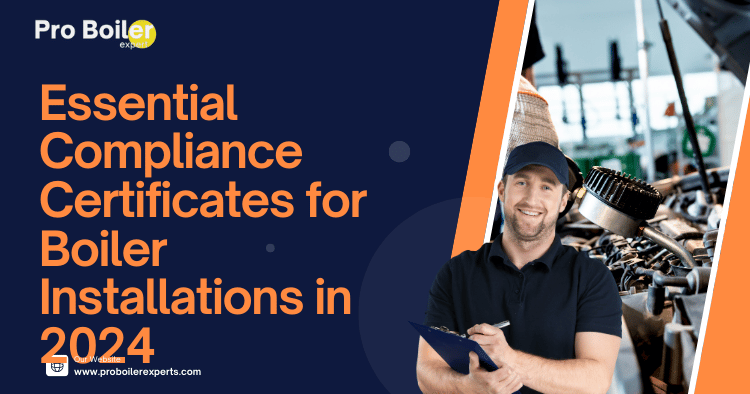Table of Contents
- Introduction
- Understanding Compliance Certificates
- Types of Compliance Certificates for Boiler Installations
- Importance of Compliance Certificates
- How to Obtain Compliance Certificates
- FAQs about Compliance Certificates for Boiler Installations
- Conclusion
Introduction
As we step into 2024, ensuring that your boiler installation meets all necessary compliance standards is more important than ever. Compliance certificates not only demonstrate adherence to legal requirements but also promote safety and efficiency in your heating system. This blog will explore the essential compliance certificates necessary for boiler installations, helping you understand their significance and how to obtain them.
Understanding Compliance Certificates
Compliance certificates are official documents issued by licensed professionals or regulatory authorities that confirm a system meets specified standards and regulations. In the context of boiler installations, these certificates ensure that your appliance operates safely, efficiently, and in accordance with the law. They provide peace of mind for homeowners and landlords alike, protecting both occupants and property.
“Compliance certificates are not just formalities; they are essential for ensuring the safety and efficiency of your heating systems.”
Types of Compliance Certificates for Boiler Installations
When installing a boiler, several compliance certificates may be required. Let’s delve into the most common types:
3.1 Gas Safety Certificate
The Gas Safety Certificate, also known as the CP12, is crucial for any property with gas appliances. This certificate verifies that your boiler and other gas appliances have been inspected by a registered Gas Safe engineer and are operating safely. In the UK, it is a legal requirement for landlords to obtain an annual gas safety check for their rental properties.
Key Points:
- Valid for 12 months.
- Required for all rental properties.
- Provides documentation of safety checks.
“Always ensure your gas appliances are checked annually to avoid potential hazards.”
Further Reading:
3.2 Building Regulations Compliance Certificate
This certificate confirms that your boiler installation complies with local building regulations, which cover various aspects such as safety, energy efficiency, and environmental impact. When you install a new boiler, your installer should notify your local council, who will issue this certificate upon successful inspection.
Key Points:
- Issued by local authorities.
- Ensures compliance with safety and energy efficiency standards.
- May be required when selling a property.
“Compliance with building regulations not only protects you legally but also enhances the safety and efficiency of your installation.”
3.3 Energy Performance Certificate (EPC)
An Energy Performance Certificate provides an assessment of a property’s energy efficiency. While not specifically for boilers, having an efficient boiler can significantly impact a property’s EPC rating. An EPC is required when a property is sold or rented, and it can influence potential buyers or tenants.
Key Points:
- Rated from A (most efficient) to G (least efficient).
- Required for property sales and rentals.
- Can lead to cost savings on energy bills.
“An efficient boiler can boost your property’s EPC rating, making it more attractive to potential buyers or tenants.”
Learn More:
3.4 Manufacturer’s Warranty Certificate
When you purchase a new boiler, it often comes with a manufacturer’s warranty that covers defects or failures for a specified period. This warranty is crucial for ensuring that your investment is protected and typically requires that the installation is carried out by a qualified professional.
Key Points:
- Protects against manufacturing defects.
- Valid for a specified period, often 5-10 years.
- May require annual servicing to maintain validity.
“Always check the terms of your manufacturer’s warranty to ensure you’re covered in case of defects.”
Importance of Compliance Certificates
Compliance certificates serve as proof that your boiler installation meets all required safety and efficiency standards. They help in:
- Ensuring Safety: Protects occupants from potential hazards associated with faulty installations.
- Legal Compliance: Avoids penalties or legal issues that may arise from non-compliance.
- Property Value: Enhances the resale or rental value of your property by demonstrating compliance.
- Energy Efficiency: Validates your commitment to energy efficiency, which can lead to reduced utility bills.
“Investing in compliance certificates is an investment in safety, legality, and the value of your property.”
How to Obtain Compliance Certificates
Obtaining compliance certificates involves several steps:
- Hire Qualified Professionals: Always engage licensed and certified engineers for your boiler installation. Consult articles like Installation Day: What to Expect for Your New Boiler for guidance.
- Schedule Inspections: After installation, schedule necessary inspections with relevant authorities or professionals.
- Receive Documentation: Ensure you receive all compliance certificates upon successful completion of inspections.
- Keep Records: Store your compliance certificates in a safe place for future reference, especially when selling or renting your property.
“Keeping your compliance certificates organized can save you time and stress when it’s time to sell or rent your property.”
FAQs about Compliance Certificates for Boiler Installations
Q1: How often do I need to renew my Gas Safety Certificate?
A1: You need to renew your Gas Safety Certificate annually. It’s essential to schedule a yearly inspection to ensure ongoing safety compliance.
“Stay proactive with annual checks to maintain safety and compliance.”
Q2: What happens if I don’t have the required compliance certificates?
A2: Operating a boiler without the necessary compliance certificates can result in hefty fines, legal action, and increased risks to safety.
Q3: Can I install my boiler myself?
A3: No, it is illegal to install gas appliances if you are not a qualified Gas Safe registered engineer. Always hire a professional.
Q4: How long does it take to obtain compliance certificates?
A4: The time frame varies depending on the type of certificate and local council processes, but you can typically expect it to take a few days to a couple of weeks.
“Patience is key when waiting for compliance certificates; they ensure your installation meets all necessary standards.”
Conclusion
In 2024, compliance certificates for boiler installations are more than just paperwork; they are vital documents that ensure safety, legality, and efficiency in your heating systems. By understanding the types of certificates required and how to obtain them, you are taking an essential step toward protecting your property and its occupants. If you have any further questions or need assistance, don’t hesitate to reach out to a licensed professional who can guide you through the process.
“Knowledge is power. Stay informed and compliant to keep your home safe and efficient.”
Also, look for additional information on Essential Legal Requirements for Boiler Installation to stay compliant and informed. For more detailed information on compliance regulations, visit GOV.UK and stay informed to keep your home safe and compliant!





